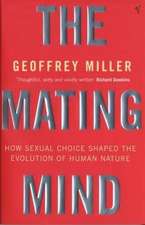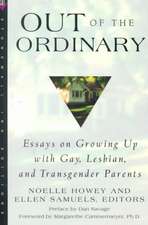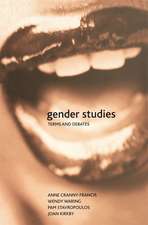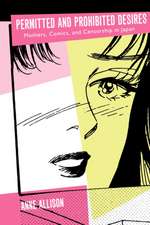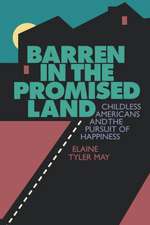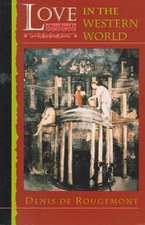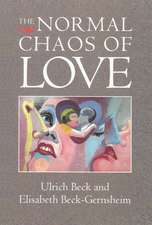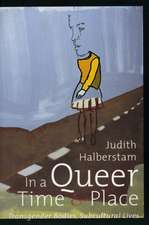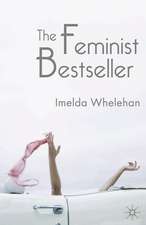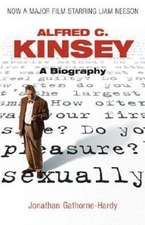Queer Lovers and Hateful Others: Regenerating Violent Times and Places
Autor Jin Haritawornen Limba Engleză Paperback – 19 iul 2015
Berlin is once more capital of queer arts and tourism. Queerness is more visible today than it has been for decades, but at what cost? In Queer Lovers and Hateful Others, Jin Haritaworn argues that queer subjects have become a lovely sight only through being cast in the shadow of the new folk devil, the 'homophobic migrant' who is rendered by society as hateful, homophobic, and disposable.
At the centre of this book is the concept of 'queer regeneration.' Haritaworn sees the queer lover as a transitional object which allows the present-day neoliberal regime to make punishment and neglect appear as signs of care and love for diversity. Alongside this shift, in the wake of older moral panics over crime, violence, patriarchy, integration, and segregation, the new Other, that is, the homophobic migrant appears. To understand this transition, Queer Lovers and Hateful Others looks at the environments in which queer bodies have become worthy of protection, and the everyday erasures that shape life in the inner city, and how queer activists actively seek out and dispel the myths of sites of nostalgia for the 'invented traditions' of women-and-gay-friendliness.
Haritaworn guides the reader through a rich archive of media, arts, policy, and activism, including posters, newspaper reports, hate crime action plans, urban projects, psychological studies, demonstrations, kiss-ins, political speeches, and films. In the process, queer lovers, drag kings, criminalised youth, homosexuals persecuted under National Socialism, and other figures of degeneracy and regeneration appear on a shared plane, where new ways of sharing space become imaginable.
At the centre of this book is the concept of 'queer regeneration.' Haritaworn sees the queer lover as a transitional object which allows the present-day neoliberal regime to make punishment and neglect appear as signs of care and love for diversity. Alongside this shift, in the wake of older moral panics over crime, violence, patriarchy, integration, and segregation, the new Other, that is, the homophobic migrant appears. To understand this transition, Queer Lovers and Hateful Others looks at the environments in which queer bodies have become worthy of protection, and the everyday erasures that shape life in the inner city, and how queer activists actively seek out and dispel the myths of sites of nostalgia for the 'invented traditions' of women-and-gay-friendliness.
Haritaworn guides the reader through a rich archive of media, arts, policy, and activism, including posters, newspaper reports, hate crime action plans, urban projects, psychological studies, demonstrations, kiss-ins, political speeches, and films. In the process, queer lovers, drag kings, criminalised youth, homosexuals persecuted under National Socialism, and other figures of degeneracy and regeneration appear on a shared plane, where new ways of sharing space become imaginable.
Preț: 208.30 lei
Nou
Puncte Express: 312
Preț estimativ în valută:
39.86€ • 41.46$ • 32.91£
39.86€ • 41.46$ • 32.91£
Carte tipărită la comandă
Livrare economică 15-29 aprilie
Preluare comenzi: 021 569.72.76
Specificații
ISBN-13: 9780745330617
ISBN-10: 0745330614
Pagini: 237
Dimensiuni: 133 x 216 x 18 mm
Greutate: 0.32 kg
Editura: PLUTO PRESS
Colecția Pluto Press
ISBN-10: 0745330614
Pagini: 237
Dimensiuni: 133 x 216 x 18 mm
Greutate: 0.32 kg
Editura: PLUTO PRESS
Colecția Pluto Press
Notă biografică
Jin Haritaworn is assistant professor of gender, race, and environment at York University in Canada. They are the author of Ambivalent Desires: Hybrid Bodies and Changing Nationalisms.
Cuprins
Introduction: Queer Regenerations
1 Setting the Scene
2 Love
3 Hate
4 Queer Nostalgia
5 Conclusion: Kiss good morning, kiss good night
6 Epilogue: Travels beyond the ‘most homophobic’
Bibliography
Index
1 Setting the Scene
2 Love
3 Hate
4 Queer Nostalgia
5 Conclusion: Kiss good morning, kiss good night
6 Epilogue: Travels beyond the ‘most homophobic’
Bibliography
Index
Recenzii
“A smart, courageous, and at times unsettling indictment of LGBTQ complicity with xenophobic violence. If you care deeply about social justice, read this brilliant book.”
“A brilliant analysis which shatters the singularity of the universal gay/trans subject to expose hir collusion in the production of the 'homophobic Muslim.' This highly engaging book is a must-read for all concerned with issues of justice, demilitarization, and radical transformation in global politics.”
“This exciting book by one of the most brilliant emerging scholars today brings a novel approach to 'queer gentrification' and a host of new concepts pertaining to space, queer and trans subjects of color, race, sexuality, and violence.”
“An original and highly impactful contribution to critical race and ethnic studies, gender and sexuality studies, and urban studies. The quality of the research is impeccable, and the reach of the book’s pedagogical and intellectual contributions demonstrates the best potentials of critical interdisciplinary and transdisciplinary scholarship.”
“Seamlessly synthesizes the relationships between Islamophobia, racism within Europe and the United States, and how the global war on terror serves to reinforce the politics of homo-nationalism. Brilliant and fierce, a must-read for all those interested in imagining new liberatory politics.”
“Queer Lovers and Hateful Others is a trenchant and unrelenting critical gaze at the tensions between a nascent people-of-color consciousness and the swirling turbulence of homophobia and xenophobia in twenty-first century Germany. Haritaworn offers the promise and perils of encounters between activist practices, quotidian aspiration, legal statutes, and other forces that animate and bring to life alternative ways of inhabiting marginalized spaces and times. More than just a sensitive portrait of lives, sites, and energies, this book is an incitement to think queerly, to dream otherwise.”
“In an exemplary intersectional cultural analysis, Haritaworn explores racial and sexual formations in contemporary and historical Berlin. Based on interviews with Queers and Trans of Color,Queer Lovers and Hateful Others is a timely intervention in many current debates, from the privileging of the memory of the Holocaust as the main architecture of German racism, via the genealogy of the ‘homophobic Muslim,’ to the loss of the memory of slavery and colonialism in white (gay) citizens, the author accomplishes an impressive, in-depth portrait of German homonationalism. A must-read!”
“Queer Lovers and Hateful Others constitutes a sophisticated masterpiece of decolonial queer/transgender theory. Taking as its point of departure the experiences of queer/transgender people of color, the author analyzes the complex time, space, intimacy, racial, and class dimensions of the colonial project of queer regeneration in neoliberal urban spaces. The author uses a wide range of fields of scholarship, such as transnational gender studies, disability studies, and queer studies, as well as race and transgender studies, without falling into a reductionist identity politics by contextualizing the urban processes within the context of the global political economy of our times. The author examines queer spatial formations in the neo-liberal city in relation to questions of spatial racialization and gentrification showing the profound racial splits between white queers and queers of color. The book keeps a comparative perspective among global cities of the North. Dr. Haritaworn’s book is an important antidote to discourses about queer spaces that evade race and class. The author criticizes the celebratory and uncritical view of the white left with regard to gay imperialism and its complicities with the neoliberal city. It is a must-read for anyone interested in decolonial perspectives and postcolonial horizons."
"Queer Lovers and Hateful Others proves to be an essential contribution to the queer ethnic studies discussions that Haritaworn cites as a potential site for insurgent knowledge formation that resists, rather than diversifies, violent systems. This book opens up space for such resistance."

